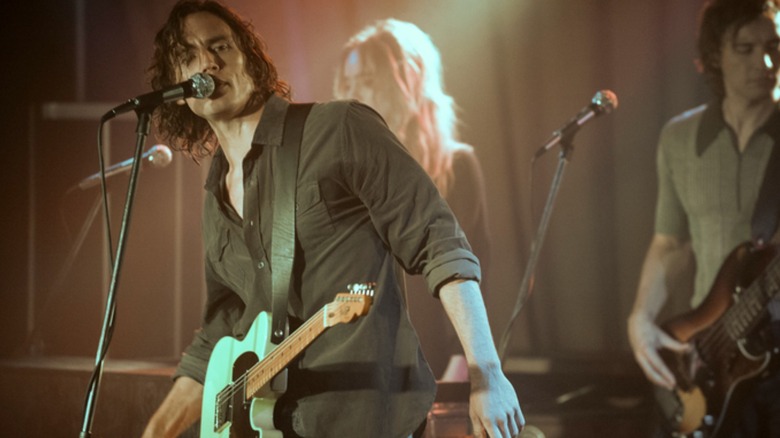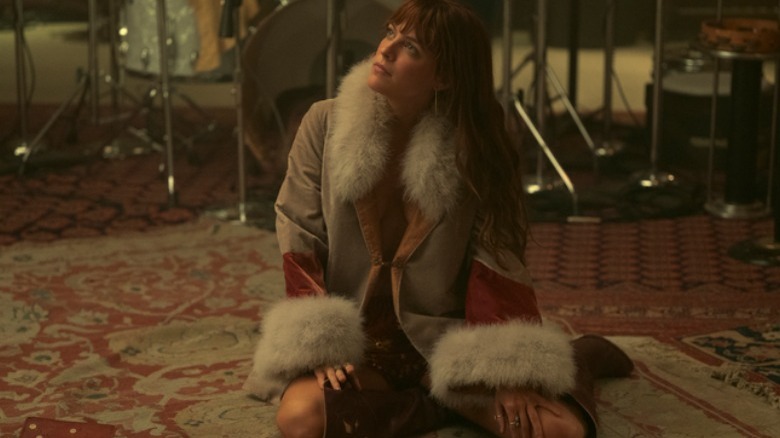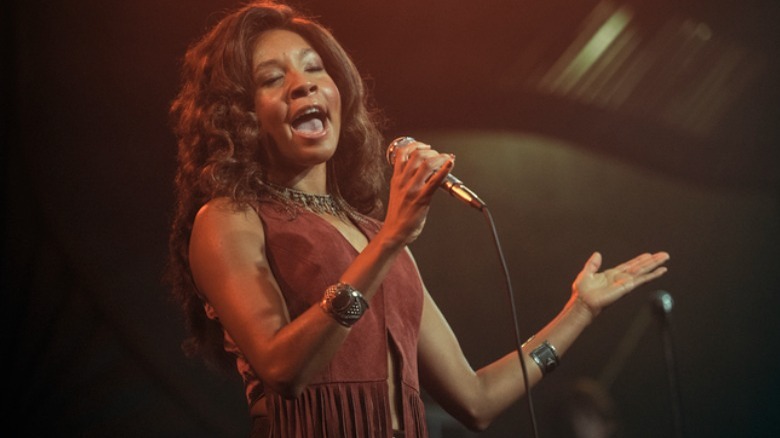The Interview Format In Daisy Jones & The Six Doesn't Quite Work Like The Book
This post contains spoilers for "Daisy Jones & The Six" and Taylor Jenkins Reid's book of the same name.
When Taylor Jenkins Reid's novel "Daisy Jones & The Six" hit the stands in 2019, the book instantly became a pop culture phenomenon. The reasons were multifold: Reid not only captures the nostalgia-laden essence of mid-1970s rock and roll but also manages to weave a compelling saga about a fictional rock band's overnight rise to fame, followed by their sudden split and the aftermath of the same. The tumultuous, complicated dynamic shared by Daisy and band frontrunner Billy Dunne acts as the catalyst for the central events in the novel, which simultaneously maps interconnected character arcs to present several versions of the truth.
Reid accomplishes this by structuring the book like an oral history, told entirely through the perspectives of the characters involved, which often contradict one another, making the truth elusive. This sort of Rashomon effect serves to make the novel especially compelling, lending nuance to retold events and forever redefining key relationships that eventually contributed to the disbanding.
Scott Neustadter and Michael H. Weber's adaptation of the novel makes an ambitious attempt to bring the book's dynamic characters to life. While the Prime Video adaptation succeeds in telling an emotionally-resonant tale, the show's replication of the book's interview structure falters when it comes to pacing the biggest beats of the story. As the interview process itself drives the story forward, allowing us a glimpse into their turbulent, exhilarating shared history, its execution comes off as shoddy and fragmented, robbing the saga of its greatest strength — the unreliability of collective perspectives and individual memory when it comes to a single event.
The objective truth
Although "Daisy Jones & The Six" is mostly faithful to Reid's source material, the adaptation makes several changes to facilitate a smoother transition to the small screen. Major alterations include the omission of the sixth band member, Pete, although his absence does not hamper the series in any major way whatsoever. However, what does hamper the series from emerging as a convincing adaptation is its failure to understand the book's central appeal: The mystery and intrigue of unreliable narrators who offer conflicting versions of "the truth" behind why the band disbanded. As the show's events serve a singular version of the events as the objective truth, the interview structure loses most of its agency and fails to justify itself as a narrative device key to pacing and character development.
Moreover, Billy (Sam Claflin) and Daisy (Riley Keough) have lingering, bittersweet feelings about their shared history because of their markedly different perspectives of how and why things went awry between them. As the show essentially omits the Rashomon device, we never know how their individual memories and recollections of the same event tint their perspective of each other in a way that's meaningful or nuanced. The same can be said about the others involved in the event — although they offer some personal comments whenever the timeline shifts to the present, these quips hardly amount to form a moving, engaging oral history about the most sought-after trailblazer of a rock band that seemingly altered the musical landscape of their times. If anything, the constant to-and-fro between the show's version of what really transpired and the personal interviews undermines the entire endeavor, giving way to awkward asides that add little to no depth to their respective characters.
A struggle for the spotlight
Reid's book unravels as a sprawling oral history that traces the roots of its key characters, including Daisy, to better understand their motivations over time. This also warrants the inclusion of backstory-laden context for secondary characters like Teddy Price (Tom Wright) and Simone Jackson (Nabiyah Be), who play smaller roles in the lives of Daisy and The Six. Perhaps the best change that the show makes is the decision to flesh out these two characters — while Teddy emerges as someone more emotionally-complex and nuanced than a run-of-the-mill music producer backing the band, Simone is allowed to flourish into the disco pioneer she is destined to be. However, this proves to be a double-edged sword, as Teddy and Simone's arc ends up feeling more meaningful than that of the band's, and the interview format adds nothing to balance out these stories hounding for the narrative spotlight.
This schism is heightened due to the way the show handles its subject matter. Although hard-hitting at times, the drama that unfolds within the band is ultimately riddled with clichés and predictable tropes, in contrast to the love story between Simone and Bernie (Ayesha Harris), who present a layered, refreshing perspective on what it means to be Black and queer in NYC in the '70s. Simone's arc also raises key questions about honesty in friendships, artistic integrity, and the personal conflicts that one needs to overcome in the quest for authenticity.
While Daisy's saga has glimmers of these themes, her final choice essentially boils down to happiness versus ambition. One would think that her interview would shed greater light on this inner conflict, but it only ends up serving as a sanitized response to a potentially-riveting, life-altering personal choice. As for The Six, their stories undergo the same underwhelming sentiment.


